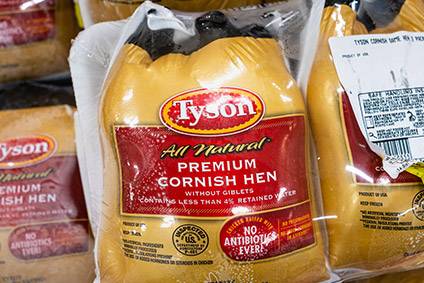
Tyson Foods is hoping a coronavirus vaccine will lead to an improvement in its underperforming chicken business, which saw sales and volumes decline in the US protein heavyweight’s fourth quarter due to a mix of plant inefficiencies, higher prices and absenteeism, all related to Covid-19.
Chicken volumes and sales have been particularly impacted by the closure of the out-of-home market, with the channel switch into retail as more people ate at home failing to offset the drop in demand, while sales of beef and pork products rose in the quarter to 3 October.

Discover B2B Marketing That Performs
Combine business intelligence and editorial excellence to reach engaged professionals across 36 leading media platforms.
Sales of chicken products dropped 7.5%, while volumes were down 5.4%. For beef, sales and volumes were up 2.7% and 3.8%, respectively. Pork climbed 1% and 7% across those parameters. Tyson garners 31% of group revenues through foodservice, and 45% through consumer-focused channels. For chicken alone, the ratio is 39% versus 43%.
President and CEO Dean Banks, who replaced Noel White last month, said under-staffing due to the pandemic and related inefficiencies at its poultry plants pushed up chicken prices on a cost per pound basis during the quarter.
Banks indicated the re-opening up of the foodservice channel will be a component behind Tyson realising a previously-announced target, revealed before the onset of the crisis, for the company to reap US$200m from “operational improvements in the chicken business”.
“I remain hopeful that a vaccine and a gradual return to normalcy [chicken products] in the second half will result in a net improvement for the year,” Banks told analysts yesterday (16 November) after Tyson reported its fourth-quarter and full-year results.

US Tariffs are shifting - will you react or anticipate?
Don’t let policy changes catch you off guard. Stay proactive with real-time data and expert analysis.
By GlobalData“As far as recovering that full $200 million, there will be some value in the recovery from Covid in foodservice and getting our plants back up to full operational capacity. Our chicken business is still performing below our long-term earnings expectations. While our Tyson frozen, value-added and premium air-chilled products have performed strongly, other businesses have not. We expect progress toward these issues to face headwinds from absenteeism and other Covid-19 related complexities during the first half of the year.”
Tyson’s chicken business delivered fourth-quarter operating income of $91m, for a 2.9% return on sales, compared to $483m and a 12.2% return on beef. Operating income for pork was $162m for a return of 12.8% on sales.
Finance chief Stewart Glendinning, speaking on the same earnings call, added: “Recovering chicken is going to be a long effort. We have got a handful of plants that are just not operating efficiently. [We] remain committed to take the actions necessary to return us to top quartile performance.”
Tyson incurred $540m of “direct incremental” Covid-19 costs for the year, which included around $300m in bonus payments and other benefits paid to staff.
Glendinning said Tyson expects a further $300m in related Covid-19 costs in its new financial year subject to the course and duration of the pandemic, but he stressed “this is a point-in-time estimate”.
As much of the foodservice market shut down, and some people still showed a reluctance to go in-store, Tyson’s sales through e-commerce have surged, as has been the case for many food manufacturers during the pandemic.
Sales through the channel increased 126% in the quarter and 99% for the year.
“Tyson’s online sales penetration through its e-commerce channel partners is now estimated at over $1bn and we expect continued relevance of this channel moving forward,” Banks said. The company’s total annual sales were $43.19bn, up 1.9% on the 2018/19 financial year.
Similarly, appetite for plant-based products through retail has also picked up, with sales rising 250% during the course of the year, Tyson said, albeit from a small base. “We are excited to build on this momentum alongside our customers as we meet evolving consumer demand for years to come,” the CEO said.
To support its ambitions in the meat-alternative sector, Tyson this month announced the launch of its Raised & Rooted brand in Europe, introduced to US consumers last year.
Banks noted Tyson’s “core” retail lines through the retail channel notched up a ninth straight quarter of market share growth (almost two percentage points), with volumes up 13%.
Group sales for the quarter amounted to $11.46bn, up 5.3% on the corresponding period a year earlier.
Operating income climbed to $1.01bn from $604m over the three months, and was up 11% on an annual basis at $3.11bn.
Net income attributable to Tyson rose to $692m for the quarter, from $369m, and was 5.9% higher for the year at $2.14bn.
Glendinning said Tyson is guiding to annual revenues of $42bn to $44bn for the new financial year.





